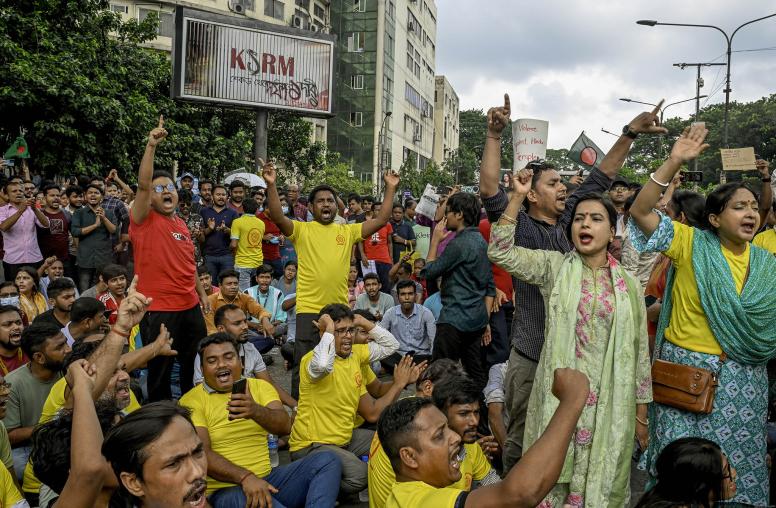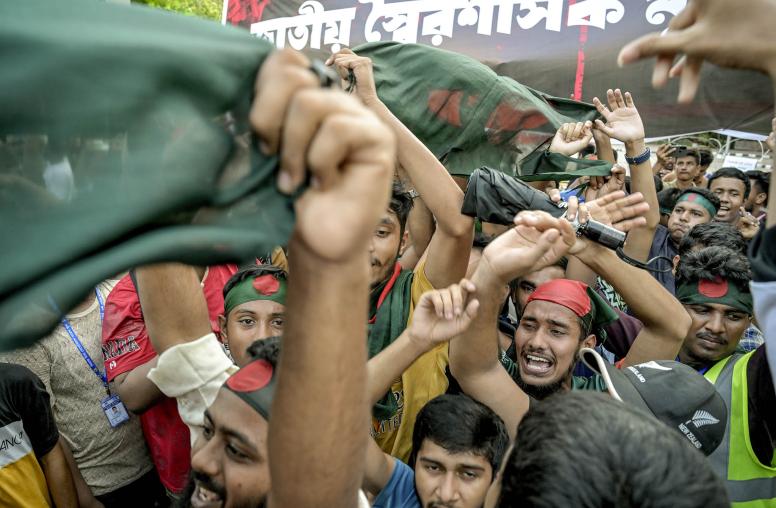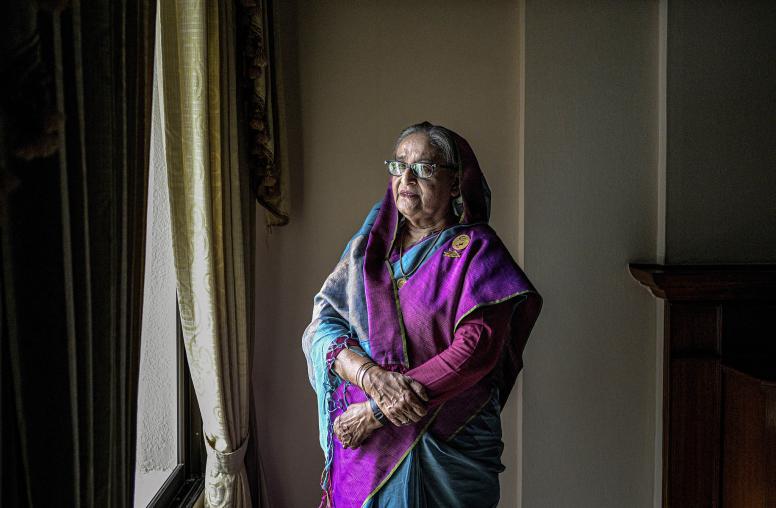Bangladesh’s Balancing Act Amid the U.S. Indo-Pacific Strategy
Moving forward, U.S.-Bangladeshi relations will likely reflect a continued mix of bilateral cooperation leavened by some degree of mutual frustration.
As the Biden administration implements its new Indo-Pacific strategy, Bangladesh’s relationships with neighboring India and China are drawing renewed interest from U.S. policymakers. U.S. Undersecretary for Political Affairs Victoria Nuland visited Dhaka in late March and signed a draft defense cooperation agreement; last year, Special President Envoy for Climate John Kerry also went to Dhaka in advance of the Leaders’ Summit on Climate. At the same time, Washington retains concerns over democratic backsliding, human rights abuses and constraints on free and open electoral competition in the country. Experts Anu Anwar, Geoffrey Macdonald, Daniel Markey and Jumaina Siddiqui assess the factors shaping Bangladesh’s relations with its neighbors and the United States.

This year marks the 50th anniversary of relations between the United States and Bangladesh. Over the past five decades, Bangladesh and the United States have developed a complex relationship that spans economic and security ties as well as transnational issues like climate change. What is the strategic outlook for this relationship?
Markey: Bangladesh and the United States maintain a generally positive relationship. The United States is a top destination for Bangladesh’s exports, critical to its fast-growing economy (now the second largest in South Asia, ahead of Pakistan). In the COVID-19 era, the United States has provided over 61 million vaccine doses to Bangladesh, more than to any other country in the world. Washington and Dhaka also cooperate on a variety of security issues, including through bilateral dialogues, defense assistance and training.
That said, 2021 was a difficult year for U.S.-Bangladesh relations. It started on a positive note with Washington’s invitation to the participate in the Leaders’ Summit on Climate Change, but by the end of the year Washington imposed sanctions on Bangladesh’s Rapid Action Battalion (RAB) and several of its current and former officers for a longstanding pattern of human rights violations, including extrajudicial killings. That same month, the Biden administration did not extend Bangladesh an invitation to the virtual Summit for Democracy.
The future is likely to reflect a continued mix of bilateral cooperation leavened by some degree of mutual frustration. On the cooperative side, I expect that the United States will aim to enhance its relationships with important regional players, including Bangladesh, as a part of the Biden administration’s recently announced Indo-Pacific strategy. The signing of a draft defense cooperation during Nuland’s visit to Dhaka is a tangible reflection of that effort. But Washington may well continue to see Dhaka as a half-hearted partner in other areas of concern, not least because Bangladesh has established a successful and deep set of working relationships with China too.
How are India and China interacting with Bangladesh, and how is Dhaka balancing these relationships with its ties to the United States?
Anwar: India’s interest in Bangladesh is driven by strategic and economic factors. Since Bangladesh’s independence, New Delhi has sought to ensure that Bangladesh’s territory is not used against Indian interests. For decades, Indian officials have worried about external support to separatist movements in Northeast India. More recently, India has aimed to curb Chinese inroads in South Asia. India also seeks market access and to maintain the flow of its fifth-largest remittances from Indians working in Bangladesh. New Delhi aspires to build greater east-west road connectivity, to facilitate goods and service trade from West Bengal to underdeveloped Northeast India, and to connect to the Bay of Bengal. In peacetime, this connectivity has significant economic value for India. Improved roads also facilitate force mobilization along the disputed border with China in the event of a conflict.
China, in turn, seeks access to the Bangladeshi coast and the Bay of Bengal through the construction of ports and an overland economic corridor that would connect that area with China’s landlocked provinces. Investing in strategic assets in Bangladesh also supports Chinese objectives of reducing India’s influence in South Asia. Bangladesh is second only to Pakistan in buying arms from China. As the world’s eighth-largest country by population, Bangladesh is likely to remain an important market for Chinese investors and exporters.
Dhaka has reached out to Washington as a “third-way-balancing” effort that aims to use U.S.-Bangladesh ties as leverage to set better terms with both China and India. However, as U.S.-India collaboration has increased through the “Quad” and other strategic frameworks, Dhaka appears increasingly worried that it could be forced to make a binary decision between U.S.-India or China.
Infrastructure-driven economic devolvement is the top priority for Bangladesh, and it needs technical assistance and investment in mega-infrastructure projects. China offers both to Bangladesh, whereas India is unable to compete with China on either front. However, Japan and the EU remain key player for Bangladesh’s socio-economic development, and the United States is Bangladesh’s largest export destination — accounting for 14.5 percent of total exports, primarily ready-made garments, which is Bangladesh’s main export and lifeline of foreign currency. Bangladesh has sought to balance its relations with China, the United States and India; on the same day in March that the United States and Bangladesh signed their draft defense cooperation agreement, Prime Minister Sheikh Hasina also inaugurated a Chinese-funded power plant, which will be Bangladesh’s largest.
Across South Asia we are seeing the backsliding of democracy, shrinking space for civil society and curbs on freedom of expression — Bangladesh is no exception. V-Dem calls Bangladesh an “electoral autocracy” and Freedom House deems the country “partially free.” What strides has the country made to address these concerns and what more needs to be done?
Macdonald:In Bangladesh, international human rights groups and democracy watchdogs have persistently alleged that political opponents, journalists, civil society organizations and ordinary citizens face harassment, imprisonment and even murder for criticizing the government. Although Bangladesh’s government denies these claims, the international community, including the United Nations and European Union, has criticized Bangladesh’s human rights record under the ruling Awami League (AL) and the Biden administration recently sanctioned Bangladesh’s security forces for human rights abuses after denying Bangladesh an invitation to its Summit for Democracy in December 2021.
The Bangladesh government’s reaction to the sanctions has included both denial and reform. In recent remarks, Prime Minister Sheikh Hasina called the sanctions “condemnable” and other Bangladeshi officials have claimed anti-AL groups have misrepresented the government’s actions to the international community. While this rhetoric is useful for the AL’s domestic political standing, the party nevertheless appears to have taken steps to improve its performance on human rights. The foreign ministry created a “human rights cell” to monitor domestic human rights issues. In March, the foreign minister acknowledged abuses of Bangladesh’s Digital Security Act and the occurrence of enforced disappearances — a notable public admission — and said the government is taking steps to address these problems. Indeed, in the months since American sanctions were levied, Bangladeshi activists have noticed a decline in extrajudicial killings. The Bangladesh government has cited these statistics to push for sanctions removal. Despite the public acrimony, the Bangladesh and U.S. governments appear committed to cultivating a close and productive relationship and have continued high-level diplomatic engagements.
With Bangladesh’s next national election scheduled for late next year, domestic and international attention is increasingly focusing on political and electoral freedoms. While the Awami League says elections in Bangladesh are fair, international organizations have criticized Bangladesh’s recent polls as deeply flawed. Bangladesh’s primary opposition party has rejected the newly formed election commission and has so far said it plans to boycott an election that doesn’t include a neutral electoral administration. However, local elections in 2021 and 2022 indicate signs of progress. In many areas, independent candidates beat candidates from the ruling party, which suggests a degree of open competition. Nevertheless, more tangible progress on electoral freedom will need to be made to mollify the government’s critics.
Bangladesh is especially vulnerable to climate change. In addition to the physical impacts, climate change has the potential to create instability and deepen rifts in the country’s social fabric. What role can the United States play to help Bangladesh navigate these challenges?
Siddiqui: Bangladesh is on the front lines of the devastating impacts of climate change. As many as 13 million people are expected to be displaced by climate change by 2050, many from the coastal areas who will be forced to move inland. While the country is spending approximately 2.5 percent of its GDP annually on climate adaptation and resilience-building measures, Bangladesh has called on countries to honor their Paris Agreement commitments of $100 billion annually in climate financing.
Climate change will have physical and social consequences in Bangladesh, including increased communal conflict. Women, especially in coastal areas, will feel the burden most acutely. Climate induced natural disasters such as cyclones and flooding have already caused greater food and water insecurity in the country as rising sea levels cause salt water to contaminate soil and drinking water, leaving both unusable. If the United States wants to improve its relationship with Bangladesh, one opportunity would be greater support in the form of loans for climate mitigation and adaptation as well as enhancing its technical assistance focused on renewable energy generation early warning systems. Additionally, Washington could also offer technical assistance in the areas of justice, rule of law and gender equality programs intended to strengthen Bangladesh’s response to climate-related stresses in these areas.
Anu Anwar is a fellow at the Faculty of Arts and Sciences, and an associate in research at the John K. Fairbank Center for Chinese Studies, Harvard University.
Geoffrey Macdonald, Ph.D. is the Bangladesh country director at the International Republican Institute, where he manages democracy-assistance programs across Bangladesh.



